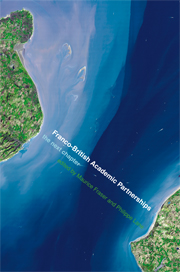Book contents
- Frontmatter
- Contents
- Notes on Contributors
- Foreword by His Excellency Bernard Emié
- Foreword by Sir Peter Westmacott
- Preface
- Part I Teaching and Training Partnerships
- Part II Research Partnerships
- 12 Franco-British Academic Partnership: Perspective from Imperial College London
- 13 Sorbonne University's Franco-British Partnerships
- 14 The École Pratique des Hautes Études (EPHE), Paris: Research Collaboration Between Britain and France
- 15 International University Partnerships and the Role of the French Connection: The Experience of a London College
- 16 Maison Française d'Oxford: A Hub of Academic Cooperation for the Humanities and Social Sciences in Oxford
- 17 Multicultural London English/Multicultural Paris French
- 18 Franco-British Cooperation in the Social Sciences During a Period of Structural Reform: Current Positions and Prospects
- 19 The Publishing Industry and Research Perspectives
- Part III Broader Perspectives
- Appendices: Addresses and Speeches at the Franco-British Academic Partnerships Seminar, French Institute, London, 5 February 2010
- Index
15 - International University Partnerships and the Role of the French Connection: The Experience of a London College
from Part II - Research Partnerships
- Frontmatter
- Contents
- Notes on Contributors
- Foreword by His Excellency Bernard Emié
- Foreword by Sir Peter Westmacott
- Preface
- Part I Teaching and Training Partnerships
- Part II Research Partnerships
- 12 Franco-British Academic Partnership: Perspective from Imperial College London
- 13 Sorbonne University's Franco-British Partnerships
- 14 The École Pratique des Hautes Études (EPHE), Paris: Research Collaboration Between Britain and France
- 15 International University Partnerships and the Role of the French Connection: The Experience of a London College
- 16 Maison Française d'Oxford: A Hub of Academic Cooperation for the Humanities and Social Sciences in Oxford
- 17 Multicultural London English/Multicultural Paris French
- 18 Franco-British Cooperation in the Social Sciences During a Period of Structural Reform: Current Positions and Prospects
- 19 The Publishing Industry and Research Perspectives
- Part III Broader Perspectives
- Appendices: Addresses and Speeches at the Franco-British Academic Partnerships Seminar, French Institute, London, 5 February 2010
- Index
Summary
Introduction: France, Europe and a Developing Global Agenda
While universities in the UK have long nurtured international collaborations, the last decade or so has seen a sharp change in the nature of these engagements. The majority of leading institutions now have a specific international strategy that seeks to foster research connections with other institutions, recruit undergraduate and postgraduate students for study in the UK and, in a growing number of cases, deliver courses overseas. Relations with European countries, including France – the focus of the present volume – have had prominence since the 1970s, when the UK joined what is now the European Union (EU), and have a particular character because of it, but must also increasingly be seen in the context of an individual university's global strategy. This chapter uses the experience of Queen Mary, University of London, to show the way in which a major institution's links with France may be seen within this wider context. It also uses the experience of the development of the University of London Institute in Paris – and its recent closer links with two of the federal Colleges, Queen Mary and Royal Holloway – to show how delivery of programmes in France matches wider institutional research and teaching priorities.
The development of integrated international strategies for universities has become a growing priority as the UK has increasingly turned to the global student market for extra revenue, both by bringing students to the UK and by offering qualifications overseas.
- Type
- Chapter
- Information
- Franco-British Academic PartnershipsThe Next Chapter, pp. 117 - 126Publisher: Liverpool University PressPrint publication year: 2011

